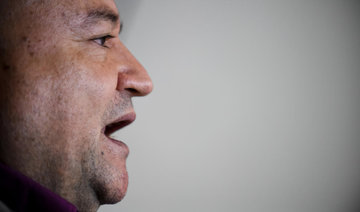BOGOTA, Colombia: US President Donald Trump is threatening that he may decertify Colombia as a partner in the drug war unless it reverses a record surge in cocaine production in the South American nation.
The shock rebuke for Washington’s staunchest ally in Latin America came Wednesday in the White House’s annual designation of nations it deems major drug producing or transit zones.
Colombia, which is source of 90 percent of the cocaine consumed in the US, has long been a fixture of the list, which was unchanged from last year. But not since the late 1990s, when contributions from the Cali cartel funded the campaign of Colombia’s then-President Ernesto Samper, has its commitment to fighting narcotics trafficking been called into question by Washington.
Twenty-two countries were designated as major drug transit zones Wednesday, and only Venezuela and Bolivia were deemed once again not to be fulfilling their international obligations to combat drug production and trafficking.
The leftist governments of both those nations are hostile to the US Yet, in a statement, Trump said he “seriously considered” also decertifying Colombia because of the “extraordinary” growth of coca cultivation and cocaine production to record levels over the past year.
He said he ultimately decided against such a designation because the Colombian armed forces are close law enforcement partners with the US He also cited improving interdiction rates and the restarting of forced eradication efforts that were significantly curtailed in 2013, when President Juan Manuel Santos prioritized reaching a peace deal with leftist rebels heavily involved in the drug trade. Two years later Santos ended aerial spraying of chemicals on illicit crops, a program that had been the backbone of almost two decades and $10 billion of US counter-narcotics work in Colombia.
But Trump warned that he would keep decertification as an “option” and expected Colombia to make “significant progress” in reducing coca cultivation and cocaine production.
There was no immediate reaction from Colombian officials.
Adam Isacson, an analyst at the Washington Office on Latin America, described Trump’s threat as a “huge mistake” that would likely reverberate throughout a region that has long resented the US drug certification process as a throwback to the days of gunboat diplomacy.
“The message to the rest of the region is that no matter how many years you collaborate with the US, if you deviate from our preferred strategy for a moment, we’ll publicly humiliate you,” Isacson said. “They’re taking the bilateral relationship to its worst place in two decades.”
The drug certification process dates from the days of President Ronald Reagan’s war on drugs and the last time Colombia was blacklisted was the late 1990s, when cocaine was found on Samper’s presidential plane and he was nearly impeached for campaign contributions from the then-dominant Cali cartel.
Decertifying Colombia would put the country in the same rogue category as Venezuela, where several top officials have been indicted on US drug charges and whose vice president was recently sanctioned by Washington as a suspected drug kingpin.
Isacson said the threat of decertification was even more worrisome because the US expressed no similar concern over the lack of help it was receiving from far more corrupt nations on the list like Honduras, a major way station for South American cocaine working its way up by land across the border and into the US.
According to the State Department’s annual anti-narcotics report, the Central American nation didn’t carry out a single maritime interdiction last year and seized just 803 kilograms of cocaine nationwide despite more than 100 instances where the US notified authorities of suspicious activity.
By contrast, bilateral maritime counter-drug cooperation between Colombia and the US led to the seizure of more than 146 metric tons of cocaine in 2016. Overall, Colombia seized 421 metric tons last year, a 42 percent jump over 2015.
But the record drug seizures aren’t keeping pace with the explosion in cocaine production, which the US estimates surged more than 200 percent since 2013 to potentially 710 metric tons last year.
The government’s strategy to combat that trend relies heavily on the cooperation of former guerrillas. Under terms of last year’s peace deal with the Revolutionary Armed Forces of Colombia, the government and former insurgents are working with peasant families to try and voluntarily eradicate some 123,000 acres (50,000 hectares) of coca this year in exchange for monthly cash stipends and alternative development projects.
US officials, who still consider the disbanded FARC a terrorist organization, are skeptical the strategy will work. A senior US State Department official in Senate testimony this week accused the FARC of co-opting the peasant groups negotiating with the government and said the peace accord has had no effect on coca production trends.
“The solution to this problem is to figure out how to cut the FARC out of having any engagement either as trafficking organizations or as allegedly supporting the efforts to address the drugs issue,” William Brownfield told the US Senate’s international drug caucus.
Trump delivers shock rebuke to Colombia over cocaine surge
Trump delivers shock rebuke to Colombia over cocaine surge

A Paris court finds 10 people guilty of cyberbullying France’s first lady Brigitte Macron

PARIS: A Paris court found Monday 10 people guilty of cyberbullying France’s first lady Brigitte Macron by spreading false online claims about her gender and sexuality, including allegations she was born a man.
The court convicted all defendants to sentences ranging from a cyberbullying awareness training to 8-month suspended prison sentences.
The court pointed to “particularly degrading, insulting, and malicious” comments referring to false claims regarding alleged trans identity and alleged pedo criminality targeting Brigitte Macron.
The defendants, eight men and two women aged 41 to 65, are accused of having posted “numerous malicious comments” falsely claiming that President Emmanuel Macron ‘s wife was born a man and linking their 24-year age gap to pedophilia. Some of the posts were viewed tens of thousands of times.
Brigitte Macron did not attend the two-day trial in October. Speaking on TF1 national television Sunday, she said she launched legal proceedings to “set an example” in the fight against harassment.
Her daughter, Tiphaine Auzière, testified about what she described as the “deterioration” of her mother’s life since the online harassment intensified. “She cannot ignore the horrible things said about her,” Auzière told the court. She said the impact has extended to the entire family, including Macron’s grandchildren.
Defendant Delphine Jegousse, 51, who is known as Amandine Roy and describes herself as a medium and an author, is considered to have played a major role in spreading the rumor after she released a four-hour video on her YouTube channel in 2021. She was given a 6-month prison sentence.
The X account of Aurélien Poirson-Atlan, 41, known as Zoé Sagan on social media, was suspended in 2024 after his name was cited in several judicial investigations. Poirson-Atlan was given an 8-month prison sentence.
Other defendants include an elected official, a teacher and a computer scientist. Several told the court their comments were intended as humor or satire and said they did not understand why they were being prosecuted.
The case follows years of conspiracy theories falsely alleging that Brigitte Macron was born under the name Jean-Michel Trogneux, which is actually the name of her brother. The Macrons have also filed a defamation suit in the United States against conservative influencer Candace Owens.
The Macrons, who have been married since 2007, first met at the high school where he was a student and she was a teacher. Brigitte Macron, 24 years her husband’s senior, was then called Brigitte Auzière, a married mother of three.
Emmanuel Macron, 48, has been France’s president since 2017.














